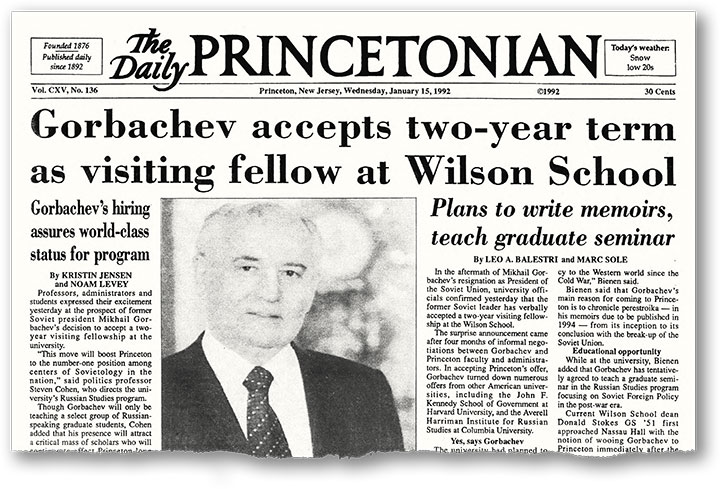On Jan. 15, 1992, readers of The Daily Princetonian woke to the news that Mikhail Gorbachev was coming to Princeton. The man who had presided over the dissolution of the Soviet Union and the Warsaw Pact reportedly had accepted a two-year visiting fellowship at the Woodrow Wilson School, and his hosts, as quoted in the Prince, were elated.
“I never thought we’d get him,” marveled Dean Donald Stokes ’51. “I almost can’t believe he’ll be here after the summer.” “This move will boost Princeton to the No. 1 position among centers of Sovietology in the nation,” declared Stephen Cohen, director of the Program in Russian Studies.
Princeton had scored a coup, aided by Secretary of State James Baker ’52, who was said to have delivered the University’s invitation to Gorbachev. According to the Prince, an unnamed State Department official described the former president’s appointment as a “major triumph in U.S.-Soviet relations” that would help “cement close ties between academic institutions in both nations.”
Gorbachev and his wife, Raisa, were to live in Joseph Henry House, a far cry from the Kremlin, but a spot well suited to writing one’s memoirs. The Prince reported that chronicling perestroika would be his primary occupation, but that he had agreed to teach a “select group of Russian-speaking graduate students.” It was hoped he would also “guest lecture — with translation — in courses such as Soviet Politics and Soviet-type Economies,” since hearing “how history was made from the man who made it would afford undergraduates a very rare and valuable educational opportunity.”
Sadly, none of this would come to pass; indeed, it was all a figment of the Prince’s imagination and the pièce de résistance of its 1992 joke issue. Not everyone was amused. As one letter to the editor put it, “I don’t think it’s funny, cute, or anything but destructive.” And yet, one year later, Princeton did attempt — unsuccessfully — to bring Gorbachev to campus, prompting the Prince to vow, “This is no joke.”
John S. Weeren is founding director of Princeton Writes and a former assistant University archivist.












No responses yet